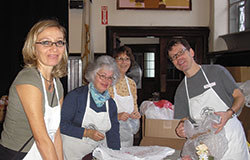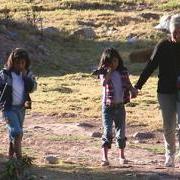|
Once Oneonta UUP member Betty Tirado heard about the trip, she knew she had to go. It didn’t matter that she didn’t know anyone who was making the three-week trek to El Girasol, a Peruvian orphanage that’s home to more than three dozen “street children,” most of whom begged and lived on the streets of Cusco before finding their way to the sanctuary. It didn’t matter that she had to cover the $3,500 to pay for the trip, set up by fellow UUPer Karen Joest, an Oneonta professor who was touched by the orphans’ plight and arranged the trip as a summer field course so her students could earn college credit while they learned about life. All Tirado knew was that she had to go. “I wanted to do something for someone other than myself, or my family, or locally,” said Tirado, a soft-spoken college accountant who has worked at Oneonta since 1982. “Karen came into the office one day getting travel arrangements straightened out and I talked to her about the trip. I asked her if community members could go. She must have thought I was kidding.” “Betty wanted to learn about the culture and help those kids,” said Joest, who teaches child and family studies. “She worked harder than anyone; she kicked butt. She was like a mom figure to all of us.” Joest’s Peru trip is one of three “Serve and Learn” programs and projects offered at Oneonta. The Peru program is the newest of the three; the others are outreach projects in India and Ghana, run by UUPers Ashok Malhotra and Kathleen O’Mara, respectively. Tirado, Joest and 14 Oneonta students spent most of June in Peru, working with Generations Humanitarian, a Utah-based organization dedicated to helping street children throughout the world. Joest, who had heard of El Girasol from a student who read author Richard Paul Evans’ bestseller The Sunflower, chose Peru because she had been there before and thought it would be an eye-opener for her students. Joest knows all about having to rely on the goodness of others to survive. She grew up in “abject poverty” in an Indiana inner-city project, the daughter of a farmer who lost his farm in a fire and was forced to move because he couldn’t afford to rebuild. “Agencies gave us clothing and stuff and we always tried to give back as much as we could because people gave to us,” said Joest, president of Habitat for Humanity of Otsego County. “One of the things my father always pushed was how important it is to give back to the community.” She also realized how desperately the children and the orphanage needed help. “These are kids with horrific pasts, working in the sex slave trade, and victims of work exploitation and family abandonment, violence and abuse,” she said. “Watching our students connecting and developing relationships with these kids was amazing.” While the language barrier was difficult to overcome—the Peruvian kids and adults spoke Spanish and the Oneonta team spoke English—sometimes no words were needed to communicate. “Everyone cares for each other, there’s a real family atmosphere there,” said Tirado, the mother of three grown children. “It was such an experience for me. There’s nothing I can compare it to.” Joest, Tirado and the students also helped extend the orphanage’s garden, where food is grown to feed the children. They tilled 15 feet of land, which doesn’t sound too tough until you consider they had no modern tools to do the work. “We used a wooden plow and two oxen to plow the field and plant crops,” said Joest. “To us, 15 feet of corn crops is nothing. But to them, it can feed three or four more kids. So we moved rocks and did whatever we could.” Joest said she’s planning another summer studies trip to El Girasol next year. As with the last trip, next year’s trek is open to anyone who wants to come along, Joest said. Tirado was certain that she’d be going back to Peru—at some point. But it will be for a lot longer than the three weeks she spent there in June. Having more time will allow her to be able to give back even more, she said. “I’d like to move to Peru for a year.” — Michael Lisi |
Category Archives: Oneonta
Spotlight shines on three distinguished professors
|
Two SUNY Geneseo UUP members and a third from SUNY Oneonta have received distinguished professorships from the SUNY Board of Trustees, a ranking conferred for consistent extraordinary accomplishment. Mary Ellen Zuckerman, a professor in the School of Business at Geneseo, was named a distinguished service professor. Olympia Nicodemi, a professor of mathematics at Geneseo, and James Ebert, chair of the earth sciences department at Oneonta, were named distinguished teaching professors. Zuckerman has been a Geneseo faculty member since 1985 and served for nearly a decade as dean of the School of Business. She has written extensively on the development of the magazine industry, the history of the marketing research and advertising industries, and gender and media. She earned a Chancellor’s Award for Excellence in Faculty Service in 2006. Nicodemi has earned numerous awards since her arrival at Geneseo in 1981, including a SUNY Chancellor’s Award for Excellence in Teaching in 1994. In 2003, she earned two prestigious awards from the Mathematical Association of America (MAA): the Deborah and Franklin Tepper Haimo Award for Distinguished College or University Teaching of Mathematics, and the Distinguished Teaching Award from the MAA’s Seaway Section. Ebert, a member of the Oneonta faculty since 1985, is extensively involved in earth science education and the preparation of pre-service teachers. In 2007, he received a grant from the Institute for Global Environmental Strategies to develop a graduate course at Oneonta specifically designed for earth science teachers. Ebert received a Chancellor’s Award for Excellence in Teaching in 1993. — Karen L. Mattison |
Soup (and sandwiches) for the soul: Oneonta UUPers lend a hand by helping out in the community

|
|
For close to two dozen UUPers at SUNY Oneonta, giving back to the community and celebrating solidarity can be summed up with two words: Saturday’s Bread.
Twice a year for the last four years, a troupe of caring UUPers have set aside time to volunteer at Saturday’s Bread, a non-denominational soup kitchen sponsored by the Oneonta First United Methodist Church. The kitchen serves free hot meals every Saturday to anyone who stops in.
UUPers spent the morning and afternoon at the church Nov. 1, preparing about 200 meals of soup and sandwiches for hungry singles and families grateful for a hot meal and friendly faces on a chilly November Saturday. Another 100 meals were prepared for guests to take with them.
“It’s a way for us to reach out and strengthen our ties in the community,” said Oneonta Chapter President Bill Simons, a volunteer. “It also brings our members together, both new and old, to share in something that’s very meaningful.”
The Oneonta chapter began volunteering at Saturday’s Bread back in 2004, when Simons asked Linda Drake, director of the college’s Center for Social Responsibility and Community and a chapter member, to find an organization that UUPers could become involved with. Saturday’s Bread was a perfect fit, she said. This time, members of the local CSEA unit joined UUPers at Saturday’s Bread.
The volunteers arrived at 9:30 a.m., got their assignments and began to make the kitchen hum. Some UUPers started preparing the sandwiches, tossing salads and making desserts. Others pulled out tablecloths, silverware and plates and started setting tables.
When the kitchen opened around 11 a.m., UUP volunteers worked as waiters and waitresses, greeted and seated guests, bussed tables, and served food on the buffet line. Afterward, they cleaned up, scrubbing pots and cleaning dishes.
“I think part of the mission of unionism in America, for UUP and our chapter, is to be an agent of change and to help society,” said Simons. “We have an obligation in our community to extend solidarity beyond the campus perimeters.”
— Michael Lisi
Scholarly pursuits – Oneonta’s Compton is our Fulbright man in Zimbabwe

|
|
It’s a nation with an inflation rate of over 15,000 percent, where political repression is common, the unemployment rate is 80 percent, and where food supplies continue to dwindle. A primary travel destination — not — but it is where UUP member Robert Compton of Oneonta wanted to go as a Fulbright Scholar.
The Fulbright Scholar program’s mission is to build mutual understanding between the citizens of the United States and other nations.
“I wanted to highlight the importance of faculty being engaged on an international front so that SUNY and UUP could have an impact on our world,” Compton said in explaining why he sought a Fulbright scholarship. He had made several prior trips to Zimbabwe and South Africa to study politics in those countries, where he established links with civil society organizations and key staffers in Parliament. He said those qualifications, plus his proposal to study the effectiveness of civil society organizations, earned him a Fulbright.
Compton arrived in Zimbabwe in January, the timing he wanted so he could observe the activity surrounding the long anticipated election in March. That’s when President Robert Mugabe, in office since 1980 who rules the African nation with an iron fist, was being challenged.
In the weeks leading up to the election, Compton eye witnessed the political repression, with an armed police presence.
“I saw a man who was distributing literature for two anti-government civil society groups beaten to a pulp by a truckload of Zimbabwe police,” Compton said.†“About a hundred people stood by in dismay and just watched. They never stopped, and even when they dragged him in the truck, the police kept kicking and hitting him.”
Compton’s research centered on evaluating the impact of such civil society organizations (CSOs) on the legislative process in Zimbabwe.
“CSOs are independent of government and the courageous people who risk their lives agitating for justice are the foundation for a better life for Zimbabweans,” Compton said.
In addition to conducting his research, Compton taught two courses at the University of Zimbabwe. To say that working conditions there are way below marginal is the height of understatement.
“There are 18-hour brownouts, no water on campus, no textbooks, no functioning technology, and an environment where students struggle to obtain food,” Compton explained.
Compton suffered through 13 days without drinking water after the fuel supply to operate the pump ran out. He also coped with the astronomical inflation.
“Prices go up every day. When I arrived in January, it cost $800,000 to ride the local transport into the city. Less than two months later, it cost $5 million,” he said.
Despite the deplorable conditions, the students valued Compton’s classes. He describes the students as very dedicated and serious and very distraught about the circumstances in which they live.
“Students know there is no future without education,” he said.
Sharing enthusiasm for the role of unions also occupied Compton’s activities. He visited neighboring Botswana to meet with the faculty and staff unions of the University of Botswana and the Botswana Institute for Administration and Commerce. He delivered an address about the importance of academic involvement in unions as a critical component in furthering democracy.
Compton credits UUP for paving the way for his Fulbright experience.
“The leadership development training provided by UUP and NYSUT gave me good insight into organizational operations and building,” he said. He also praises what he calls the climate of excellence in scholarship built up at UUP’s Oneonta chapter. He believes his overall work in Zimbabwe is in keeping with the union mission.
“As unionists, we have the responsibility to participate in the larger life of the community and to stand and act for justice,” he said.
— Donald Feldstein


